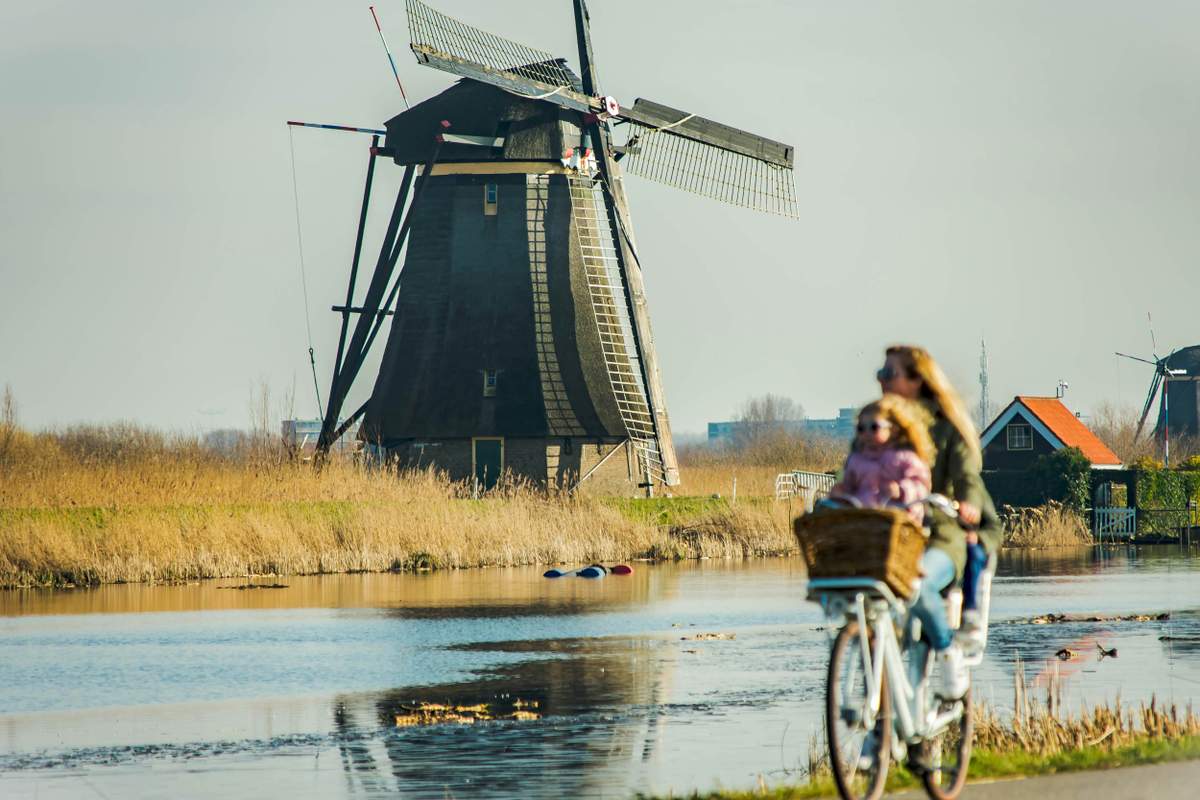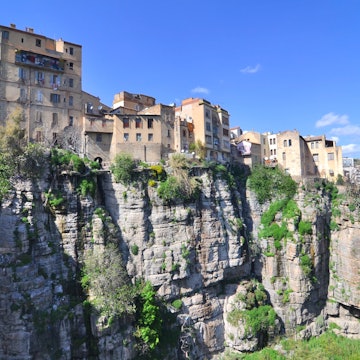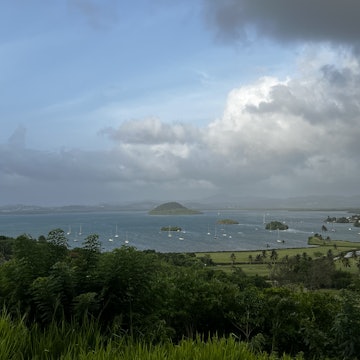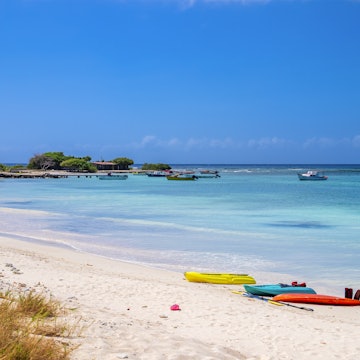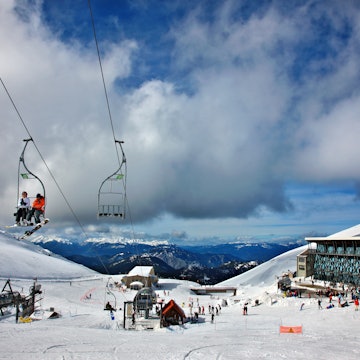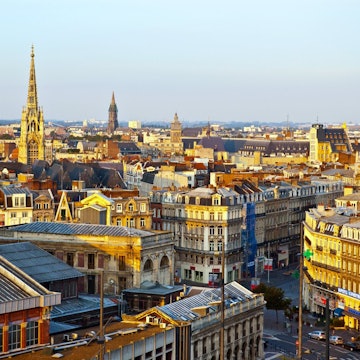

Rotterdam is your typical second city. While second cities might often be disregarded in favour of just checking out their popular counterparts (Amsterdam, we’re looking at you), to do so is a travel faux pas. Second cities are generally self-assured – existing for themselves and not just for tourists – and from this, creativity and a certain je ne sais quoi usually develops. And Rotterdam is a prime example.
Known for having Europe’s largest container-cluttered port, the maritime history here is rich but this isn’t a city stuck in the past. With its striking architectural landmarks, art-dominated streets, influential design studios and hip bars and restaurants, Rotterdam cruises along with an oh-so-cool spirit and is a city worth making a detour for.
1. Architecture
This city is an in-your-face contrast to old-world Europe, with its angular glass-clad buildings and ever-changing skyline. Having been bombed flat during WWII, Rotterdam quickly transformed itself and, as hope springs eternal, sprouted a flurry of modern buildings, cementing itself as an architecturally trailblazing city. Wander around Rotterdam and you'll see examples of architectural styles spanning post-WWII to the present day. Some impressive highlights include:
Overblaak Development: Designed by architect Piet Blom and built between the late 1970s and early '80s, this innovative series of toppled and tilted yellow-and-grey cubes paved the way for modern architecture in Rotterdam. Each house in the Overblaak Development was built to resemble a tree and together they represent a forest. One of the apartment owners has turned his into a museum for public viewing. You can peek inside Kijk-Kubus Museum-House to see just how a house tilted at a 45° angle and resting on a hexagonal pylon really works, and admire the custom-built furniture.

De Rotterdam: Named after one of the original ships on the historic Holland America Line, De Rotterdam was completed in 2013 becoming the Netherlands' biggest building. It houses hotels, restaurants, offices and residencies in its three stacked building-block towers. This ‘vertical city’ is designed in a way that if you view it from a different part of the city, it will take on a new shape and identity (derotterdam.nl).

Centraal Station: The stunning revamp of the Centraal Station was completed in March 2014 to cope with a significant rise in the number of passengers. Viewed from the north aspect it has a modest transparent glass front while the south entrance is a striking slanted roof with the original clock and station sign.

Erasmus Bridge: The Erasmus Bridge, nicknamed 'The Swan' due to its graceful shape, was designed by architect Ben van Berkel in 1996. It spans 800 metres across the Maas river and has become a symbol of the city.
Van Nelle Factory: The Van Nelle Factory (Van Nellefabriek), a former coffee, tea and tobacco factory was built between 1925 and 1931 and is considered an icon of 20th-century industrial architecture. The factory was granted UNESCO World Heritage status in 2014.

2. Art and design
From cutting edge contemporary galleries to one of the oldest museums in the Netherlands, Rotterdam has a diverse collection of art and it’s not just confined to museums – you´ll find outdoor sculptures, installations and street art spread throughout the city.
Museum van Boijmans Beuningen: One of the oldest museums in the Netherlands, the Museum van Boijmans Beuningen is one of Europe’s finest art galleries with an impressive permanent collection that spans Dutch and European painting from the Middle Ages to the 21st century, including works by Rembrandt, Van Gogh, Monet, Mondrian, Magritte as well as a dedicated Dalí exhibition room in the fantastic Surrealism wing – one of the largest collections of his works outside France and Spain.

Witte de With, Centre for Contemporary Art: On Rotterdam’s coolest street, this international art institution established in 1990 presents modern and contemporary art with a renowned reputation for its changing exhibitions (wdw.nl).
Nederlands Fotomuseum: Located in a former warehouse down on the riverfront, the Nederlands Fotomuseum hosts large special exhibitions ranging from international stars to young up-and-coming talent.
GROOS: Named after the Dutch word for pride, GROOS is a beautiful boutique concept store selling an amazing selection of pieces by Rotterdam-based designers. Items range from geometric-print cushions, artworks and delicate ceramics to chic fashion, handmade jewellery and wooden furniture (groosrotterdam.nl).

Schieblock: Left vacant for years, the Schieblock office building was transformed and redeveloped by the ZUS architectural firm. Styled as an ‘urban laboratory’, it houses over 50 small businesses including architectural studios and furniture designers such as Fabrique Urbaine (schieblock.com).

3. Flourishing food scene
Market Hall: The impressive Markthal is the first indoor market in the Netherlands, with over 100 stalls selling fresh produce, as well as restaurants and cooking classes. Adding to the city’s oeuvre of modern architecture, the building is designed by MVRDV and consists of a 40m-tall arc full of residential apartments covering the market square.
De Jong: Located in the hip De Hofbogen area, young chef Jim de Jong heads up this intimate bistro within a former train station. The food focuses on seasonal produce and creative dishes feature flowers and herbs from the restaurant’s kitchen – you may end up with a delicious tulip on your plate.
FG: Run by Francois Geurds, a former sous chef at Heston Blumenthal’s acclaimed Fat Duck in Britain, this two-Michelin-starred restaurant is certainly one for a special occasion. Francois also opened the FG Food Labs restaurant in 2014 in the Hofbogen area, complete with a ‘science lab’ for molecular gastronomy experiments (fgrestaurant.nl).
Bazar: A Rotterdam institution, Bazar buzzes any time of the day and night with hip locals and has the authenticity of a bustling souk with its colourful hanging lanterns and vibrant atmosphere. The vast menu spans North African and Middle Eastern fare, from falafel pita sandwiches to Royal Persian lamb accompanied by sweet mint tea.

4. Nightlife
De Witte Aap: Dark-wooden corner bar, De Witte Aap (The White Monkey) on Witte de Withstraat, heaves with cool creative locals from the morning coffee crowd to late-night revellers.
BAR: One of the newest arrivals on Rotterdam’s cool nightlife scene is a pop-up drinking spot simply called BAR located in the Schieblock.
Café LaBru: LaBru attracts a 30-something hipster crowd who come to taste their way through an impressive selection of top-notch gins with menu of matching tonics. Just let the friendly bartenders know your taste and they’ll sort you out.
Rotown: Dine on great food in the rear covered terrace, knock back drinks in the front bar or catch a gig in the adjoining band room at popular Rotown.
5. Designer digs
King Kong Hostel: Forget any pre-conceived notions you have when you hear the word ‘hostel’, King Kong is as chic as they come. Every little detail has been carefully considered from the roof garden, Netflix subscriptions and vintage gym equipment for use to the swinging hammocks, chef-style kitchen and ‘hangover basement’ complete with cinema. Dorms are spacious with attention given to privacy and individual rooms all have their own customised design touches.
Mainport: Sidling up against the Maas river and hugging the harbour, stunning Mainport is hands down the best location to rest your head in Rotterdam. Although with in-room hot tubs and Finnish saunas, as well as a spa with Turkish hammam and steam rooms, there may not be too much time to waste on resting (mainporthotel.com).

Kate travelled to Rotterdam with support from Rotterdam Partners (rotterdampartners.nl) and Mainport Hotel (mainporthotel.com). Lonely Planet contributors do not accept freebies in exchange for positive coverage.





